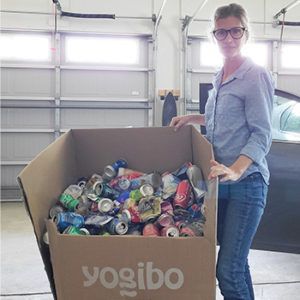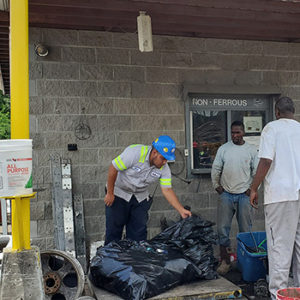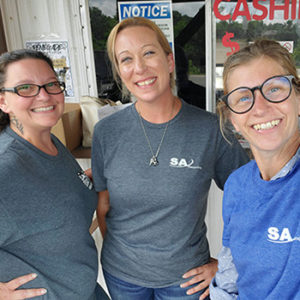Georgia is a beautiful state and Savannah is one of her jewels. Savannah’s great live oaks, feathery Spanish moss and lonely marshes are magical. But, in some places around Chatham County, it’s difficult to travel a span of 100 feet without finding soda and beer cans on the highway shoulder, along the sidewalks, peppering construction sites and in the medians. Georgia landfills collect literally tons of valuable aluminum resources that are discarded by residents, restaurants and businesses. Citizens of the low country can recycle aluminum to make a dent in this wasteful stream, keep our community beautiful, and get a little cash while you’re at it.
SA Recycling IN sAVANNAH pAYS fOR Aluminum cANS
SA Recycling is one local business that offers a better alternative to the landfill for aluminum and other recyclable metals. Nationwide, they divert millions of tons of material from landfills. SA Recycling takes in aluminum cans, refrigerators, washing machines, junk cars (no tires), and other scrap metals. The scrap is shredded, sold and remade into new metal products as part of the circular economy.

How Does scRAP mETAL rECYCLING Work?
Many of SA Recycling’s customers bring commercial container trucks filled with tons of scrap metal, or junk cars. These trucks drive onto a huge scale where their payload is weighed then emptied. Then their empty truck is weighed again to calculate the value of the load. The driver cashes out a paycheck worth hundreds or thousands.
Here’s How You Can Get Cash for Your Aluminum Cans
You don’t need to haul a trailer to bring your metal to SA Recycling. As an individual, you can bring in aluminum cans, tin cans or other scrap metal for recycling in your hatchback or on the back of your bike.
1. Collect a Half Pound of Aluminum or More
I take a walk every day around my neighborhood in Savannah Quarters for exercise and fresh air. There are lots of new homes being built, and each day I walk by construction sites that are littered with aluminum cans. I’ve started bringing a reusable plastic bag to collect cans and plastic bottles. I pitch the plastic bottles in my curbside recycle bin and the aluminum cans in a box in my garage. Within a month of starting this practice, I had collected the equivalent of two big black garbage bags full of aluminum cans.
Note: Get permission if you want to collect recyclables from construction sites or other private property. Don’t trespass and be safe. The builders and crews in my area have been very helpful. One crew even set aside their recyclables in a wheelbarrow for me to pick up each day.
Tips for Collecting Aluminum Cans in Savannah and Chatham County
- Aluminum cans can be found in just about every neighborhood or along the highways.
- If you’re considering organizing a highway cleanup, park cleanup or neighborhood cleanup, contact your municipality to learn about local rules for organized community cleanup projects.
- Safety first – wear gloves. Aluminum cans have sharp edges and can be dirty if you’re collecting litter. Wear bright clothing or a reflective vest if you are collecting in a high traffic area. Do not get hit by a car. Kids, bring your adult for safety.
- Bring a bag for collecting your cans. I’ve ended many walks with arms full of cans and bottles, and I can tell you that a bag is much easier, plus you can collect more.
- Restaurants, sports games, country clubs, events, and picnic areas are often great sources of aluminum for recycling.
- Crush your cans to maximize space. Here’s how: with both hands, grab the can at each end, twist and press together. Voila – your can will be crushed!
- Although dumpsters usually contain rich stockpiles of wasted aluminum and dumpster-diving is not technically illegal, it can be dangerous. It’s better to collect cans before they get to the dumpster.
2. Separate Your Metals
Don’t mix your metals if you bring them to SA Recycling. Tin cans should be in a separate box or bag from aluminum cans, for example. You can also bring brass ammunition shells, and steel nuts and bolts.
3. Bring Your Scrap Metals to SA Recycling
Now I had my harvest: two big bags full of aluminum scrap. These bags I threw in the back of my car and drove to the SA Recycling facility at 100 Sonny Purdue Drive.
When Wayz tells you that you have arrived at 100 Sonny Purdue Drive, you may not see anything that looks like SA Recycling. Don’t despair. Keep driving. The road will curve to the left. You will see a long green fence, and lo it will appear unto you…the SA Recycling sign!
You will drive past a security gate, and then you will see a white trailer and a cutout safety figure. Do not drive your car onto the scale. The scale is for commercial trucks. If it’s your first visit to SA Recycling Savannah, it is probably best to park your car, walk up to the cashier window in the white trailer and ask where to bring your scrap.
4. Put your Scrap on the Scale
You will be directed to drive around the corner to the right where, if you are like me, you will be impressed by the mountains of scrap material and the sorting activates that are taking place around you. You will see a small building with a large square scale on the ground in front of the building. There you might find Aaron or one of his colleagues in a safety vest and hard hat who will weigh your loot. You’ll be asked for your driver’s license and then you will be given a ticket with the amount to be paid. My two bags of aluminum cans weighed a total of 0.8 lbs and were worth $13.60.
5. Get a Check
Next, you will take your ticket back to that white trailer where the cashier will trade your ticket for a check.
Deposit your check and go contribute to the circular economy. Consider using your money from recycling to subscribe to compost services from COR or sustainably-sourced coffee from Sentient Bean, or complete the circle by purchasing a 6-pack of your favorite beverage in aluminum cans.
Aluminum is Recyclable Curbside
In Savannah, Pooler and Chatham County, aluminum and tin can be recycled in curbside containers. Curbside recycling is a much better alternative to the trash, and you don’t need to collect a minimum volume of material. Whether you have 1 can or dozens, you can toss them in your curbside recycle cart. But, if you use or collect a lot of cans, consider bringing them to SA Recycling where you can get money for your metal recycling.
What’s the Circular Economy, and Why Does it Matter to Georgians?
In a linear economy, resources are extracted to produce items. Items like beverages are sold in containers to consumers for a single use. Other products are intentionally designed for short life cycles to be discarded for newer models. This practice is called planned obsolescence. (Think about the washing machines that our parents and grandparents used for decades. Today, we feel lucky to get 5 years out of our Maytag or Whirpool.)
In a circular economy, products and their lifecycles are designed, produced and managed thoughtfully for a continuous lifecycle where resources are reused and repurposed indefinitely in more environmentally-conscious ways. In a circular economy, people use products for longer and waste much, much less. Our soils, wetlands, rivers and oceans receive fewer toxins from manufacturing processes and discarded waste. This means that plants, animals and humans live healthier lives.
Wondering about Bottle Bills?
Seven US states have bottle bills, otherwise known as container deposit legislation. When you buy carbonated beverages in a Bottle Bill state, you pay a deposit of 5 or 10 cents per can at checkout. (Glass or plastic bottles often have deposits too.) After you’ve consumed your beverage, you toss your cans in a bin in your kitchen or a bag in the mud room or a box in the garage. When the box is full of recyclables, you bring your cans and bottles back to the grocery store. You get your deposit back as cash in your pocket. Meanwhile the containers are recycled and stay out of landfills. Win. win. Georgia does not currently have a container deposit system.



